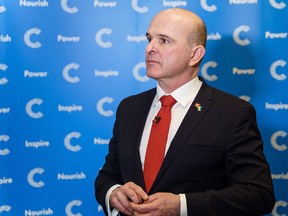
Article content
Cree? Belgian?
Advertisement 2
Article content
Before he resigned from cabinet on Wednesday afternoon, Edmonton Centre MP and Employment Minister Randy Boissonnault admitted he was not Indigenous. He insisted he had misspoken, that he hadn’t been clear enough about his ancestry, which elsewhere he has also claimed was Belgian.
It’s an easy mistake to make, mixing up the Cree and Belgian nations. I’m sure there are a lot of similarities, although none pop into mind at the moment.
I see two big offences in Boissonnault’s behaviour since questions about his lineage came to light earlier this month. One is his insistence that he never claimed to be Indigenous. And the other is his claim that he didn’t know his business partner had listed their medical supplies company as “Indigenous owned” in an effort to win federal contracts set aside for Indigenous companies.
Article content
Advertisement 3
Article content
Maybe Boissonnault never uttered the phrase “I am Indigenous,” in so many words. But look at several remarks the former minister has uttered and decide for yourself what impression he was trying to create.
Recommended from Editorial
During his first term in the House of Commons (2015 to 2019), Boissonnault proclaimed “I am non-status adopted Cree from Alberta.” I think that’s an obvious claim to be Indigenous, but if that doesn’t convince you, consider that in 2015, in Liberal campaign literature, his party listed him among their Indigenous candidates.
Once he was elected as the Edmonton Centre MP, Boissonnault joined the Liberals’ Indigenous caucus. He frequently began speeches with Cree phrases, including once in the Commons when said, “Mr. Speaker, miyotôtâkewin tatawaw. That’s Cree for ‘guests, you’re welcome, there’s room here.’” And as recently as last year, he told the Commons languages committee, “My Cree name means Strong Eagle Man.” (Admittedly, plenty of non-Indigenous people are awarded honorary Indigenous names and sometimes say things in Indigenous languages.)
Advertisement 4
Article content
Boissonnault has also, on many occasions, referred to his great-grandmother, Lucy Brenneis, as “a full-blooded Cree woman.” However, census and death records uncovered by the National Post show that Brenneis was Metis, of mixed Indigenous and German descent.
Taken together those and other statements by Boissonnault certainly indicate to me he very deliberately sought to be seen as Indigenous.
He might even felt justified in doing so. Family stories certainly can become embellished over the decades. It’s entirely possible a Metis ancestor has become full-blooded Cree over years of retelling at reunions and around the holiday dinner table.
But Boissonnault’s claim now is that he never passed himself off as Indigenous, which lacks all credibility.
Advertisement 5
Article content
He explained last week that he hadn’t been “as clear as I could have about who I am and my family’s history.” I don’t buy it. When he insisted in Parliament that he was “non-status adopted Cree,” that was pretty clear.
On the second matter — a company he co-owned passing itself of as Indigenous to win government contracts — the former minister now maintains his former business partner made that bid without his knowledge or consent.
That could be. Boissonnault’s former business partner at Global Health Imports, Stephen Anderson, has his own credibility issues. He’s been caught lying to reporters, has been the subject of several lost civil lawsuits and has yet to produce documents ordered by a Commons committee in September.
Advertisement 6
Article content
Still, it’s entirely possible that Anderson found out there were carve-outs for Indigenous contracts in several government programs and after hearing his partner, Boissonnault, make years of claims to Indigenous heritage, simply put two and two together when applying.
Boissonnault might be surprised by Anderson’s use of his status, but he almost certainly was the cause of it.
The good news for the federal Conservatives is that Boissonnault has pledged to stick around and fight for his good name, which means they may be up against a badly damaged Liberal in Edmonton Centre in the next election.
Article content




